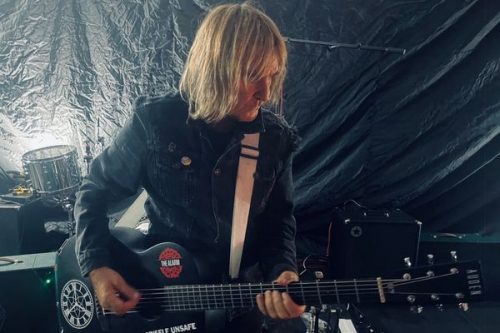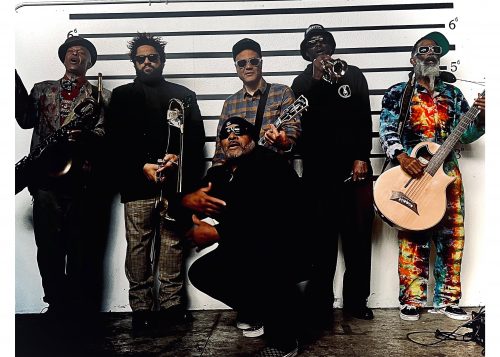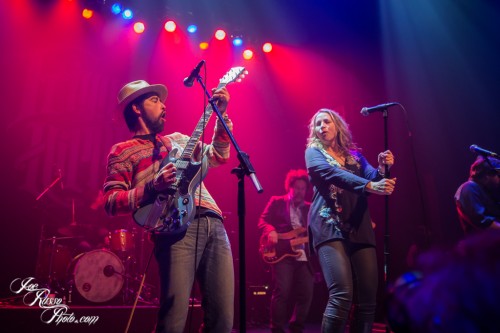For more than 40 years, Mike Peters has been churning out anthems with The Alarm, the Welsh band with punk roots that grew to arena rock stardom on the back of big songs like “Sixty Eight Guns” in 1983.
It’s no surprise that its newest album, “Forwards,” just released June 16, contains more of that verve and vitality that fans of the band have loved for decades. The shocker is where those songs came from: a hospital bed where Peters was undergoing chemotherapy for a leukemia relapse.
Peters, in New York last month to promote the album, sat down with us for a chat and a cup of tea on a rainy morning to talk about how his health issues inspired “Forwards,” editing down songs to fit into a show, why he wanted to be “the guy in the brackets” on the record sleeve and his connection to Bono and U2. The Alarm will perform at Gramercy Theatre on Friday June 23 and Saturday June 24.
The album has an uplifting feel, but the song “Next” struck me as particularly driving and positive. It certainly doesn’t sound like it was written while you were in the hospital.
I just wanted it to reflect the situation I was in where I wasn’t exactly sure what was coming next. My old drug regime that had kept me alive for so long was failing and I wasn’t sure if I was going to be able to transition onto a new set of drugs. There was no guarantee I was going to accept it. And in hospital I was thinking how we live in a litigious society and doctors and nurses, they’re afraid to give you any false hope or tell you anything that might not work out that way, so you spend a lot of time with Dr. Google (laughs). I was aware of the phrase that whatever doesn’t kill you makes you feel stronger and I didn’t want to use that because I had been there. I had been living with cancer since 1995 and you have to respect the disease for what it is, it’s part of humanity and I thought whatever’s trying to kill me makes me feel alive, and that’s where the song was born with those words in a way, because I had to generate my own hope and my own optimism to withstand the lengthy stay in hospital and find my way back to a healthy lifestyle again.
What was it like writing the album there?
When I went to hospital I knew I was going to be there for a long time, I asked if I could have my guitar in the ward. I just wanted to play to keep the calluses going on my fingers. At night I’d walk the corridors to keep my muscle strength between the IV sessions and so I started strumming. At first the guys in the opposite ward were saying, “Don’t mind us, play a bit louder.”
Did they know who you were?
Yeah, some of them did. They worked it out. One guy, he was actually American and said, “You’re the guy from The Alarm, I just texted my friends.” They were encouraging, as were the nursing staff. Then you start to realize that new songs are starting to come out of it. I started to think, have I stumbled into a goldmine of music where no one has been before and I have access to the best nuggets? So I was writing things into my phone. And even the album title, that happened because I was in the cancer center and there was a guy hovering in the ward, and I was like “what does he want?” He goes, my dad’s just moved in down the road and I’ve flown in from America, I seen you yesterday but you were sleeping and I knew it was you and I told all the fans. I was trying to keep it quiet until I knew the outcome, so I had to go online and own up to it and say, yeah, I am in hospital and there’s a lot of speculation and I wanted to reinsure everyone and put them in a positive way, and I signed off the email with the word “forwards,” and I thought, oh, that’s a song title. Next thing a song appeared out of nowhere and a theme. I was writing the songs about a place I was aspiring to get to.
That’s interesting because most songs seem to be written about where people have been or where they are …
That’s true. I had to. There was a possibility it was transferring into a different disease and the doctor wouldn’t quite tell me until after the fact, but he wasn’t concerned. There’s a lot of long-term leukemia survivors who do transform into a disease called Richter’s syndrome and that can be a different ballgame altogether.
Tell us about the shows coming up at the Gramercy Theater and what you’ll be playing. You have so much material, how do you decide what to play?
Shorten everything down (laughs). That’s what we do. I think we wrapped 21 Alarm songs into a 45-minute section recently and it was absolutely brilliant. I figured it out, it’s our 40th anniversary and just before I got ill and said how can we find time to play songs from all 40 years? So that sort of set up the chain of thought that I can shorten the songs down. To be honest, I had been doing in the lockdown, I had been doing these events for 30 people, that’s the protocols that allowed us to do it in Wales, and on a Friday night we’d do our internet Big Night In show, and they’d all say can you play this and can you play that? So I put the setlist in the hands of the fans and it became interesting to see what the requests were every week. At one time I did 56 songs on a Saturday night. And instead of doing the intro I’d go straight to the first line or leave out the third chorus or something like that, and I was packing the songs in and I thought I’m going to try this with the band, it’s going to be great. It’s almost like The Who doing “Tommy,” where I’ve created an Alarm symphony setlist if you like, and it’s packed full of songs that just come one after the other with all the essential parts, and nobody seems to miss the second verse of “Knife Edge” as long as you’ve got the chorus. I think as long as we acknowledged all the songs and played the main components, and then the surprise of going into the songs created a lot of energy in the shows, so I think it’s a great way for us to carry our history with us, and it allows us the time to play our new songs.
The Alarm started as a punk band before you moved to a more mainstream, arena rock sound. How would you describe that transition?
When it started as a punk band it was just me and I had to find some guys to be in it. … We’d always been a band that responded to what was around us, and so punk became the response and it became the route that was obvious to take. I had seen the Sex Pistols and The Clash in the earliest days and was profoundly moved by that, and then the sort of mod revival happened. When I saw the Pistols I thought Glen Matlock was the talent, he looked like the songwriter. I wanted to be a songwriter. The first record I bought was “Slade Alive!” and when I went to buy it in the record shop and I looked at the back cover, I saw “Born to be Wild” and in brackets “Steppenwolf,” and I didn’t want an album with them on it, and “In Like a Shot from My Gun” and in brackets “Slade,” and “Darling Be Home” and in brackets “Sebastian,” and I thought I don’t want Sebastain, I just want the Slade stuff, this must be a compilation album with different bands on it, I’ll buy David Bowie instead. So I bought “Aladdin Sane,” went home, put the record on, pulled out the inner sleeve, played the record and there’s a song called “Let’s Spend the Night Together,” and in brackets, “Jagger/Richards,” and I thought that’s what it means! So I went back and got Slade when I realized I was getting a Slade album. That formed my whole being in a way because my aspiration was to be the guy in the brackets. That was important to me. And I think when we were trying to make it as a band before The Alarm, the making-it became the important thing. And we got on tour with the Stray Cats and they were red hot, and we played in Liverpool the day after John Lennon was assassinated and saw all the flowers in Mathew Street, and I forgot, our band is not about the songs anymore. It’s all about getting a record deal and getting to the next gig, and we have to get back to the music. Let’s regroup again and make the next band about the songs, and if the songs aren’t good enough and they only take us to the garage, that’s as far as they’re going to take us. We’re not going to pretend to be this or pretend to be that or do all these publicity stunts to make the band happen, let’s just rely on the music. And that was the difference in The Alarm.
In America, we came here unknown. It was a bit of luck that we knew U2, and they were breaking on the “War” album and they wanted a [support] band that they knew on the road for the last 20 or so dates so they could enjoy themselves a bit more and have someone to talk to and that happened to be us. When American journalists saw us they didn’t know who we were. We weren’t like a lot of bands like Oasis or Stone Roses who came over with a lot of hype. So our first TV and radio play was in America. We just focused on letting the songs do the talking.
Speaking of U2, Bono has said some nice things about the band over the years. Are you still close with him?
Yeah, yeah, as close as you could be when you’re living in another stratosphere. Bono, I went to see him on his last solo tour in Manchester, and he gave me a fantastic shoutout from the stage and he sent me a letter and then he sent me a fantastic email at Christmas. He’s just like that as a person. If he makes a choice in life to be your friend he wants to make it work as long as it’s humanly possible. That’s what he’s like, he’s committed to everything he does, whether it’s being your friend or remembering your name. I sort of know him but I didn’t know half about him until I read his book or listened to the audio book.




Leave a Reply